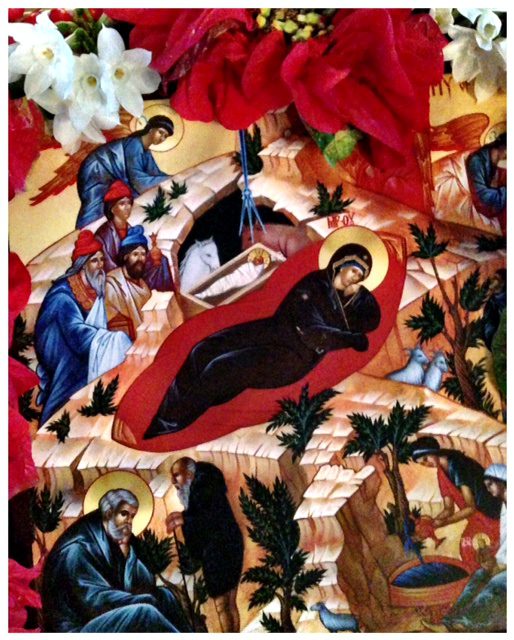For Unto Us A Child Is Born
 I wish a blessed Nativity to my fellow Russian Orthodox TAC blogger Daniel Larison, and to all you readers celebrating the feast today. The Russian church, as you may know, follows the Julian Calendar, which puts our Nativity celebration today. This is very strange for Americans. When the Russians, in their generosity, sent a priest to the little mission we founded here in West Feliciana, for us that meant accepting the Russian liturgical calendar. Christmas is the only thing that has been difficult for me to get used to. Our pastor told us to go ahead and celebrate Western Christmas with our non-Orthodox families, as a cultural thing, and to think of the Nativity in the Orthodox Church as a time when we can focus exclusively on the religious meaning of the feast.
I wish a blessed Nativity to my fellow Russian Orthodox TAC blogger Daniel Larison, and to all you readers celebrating the feast today. The Russian church, as you may know, follows the Julian Calendar, which puts our Nativity celebration today. This is very strange for Americans. When the Russians, in their generosity, sent a priest to the little mission we founded here in West Feliciana, for us that meant accepting the Russian liturgical calendar. Christmas is the only thing that has been difficult for me to get used to. Our pastor told us to go ahead and celebrate Western Christmas with our non-Orthodox families, as a cultural thing, and to think of the Nativity in the Orthodox Church as a time when we can focus exclusively on the religious meaning of the feast.
This actually works. We just returned from the Nativity liturgy, and I found myself during this morning’s prayers thinking of my reading yesterday in Dante’s Paradiso. The third and final volume of Dante’s poem is an ecstatic description of Heaven, and of theosis — the process by which we become consumed by and with God. It is a testimony to Dante’s brilliance that he can keep the dramatic tension high for a book-length exploration of blessedness. One of the dazzling feats of this poem is it’s galactic scale — literally, how the heavens unfold into the entire galaxy. That, and the intense power manifest in light coruscating through the Cosmos. I’m very close to the poem’s end, and I found myself at one point last night near tears at the overwhelming wonder of it all. From Paradiso XXIII (trans. Hollander):
I saw, above the many thousand lamps,
a Sun that kindled each and every one
as ours lights up the sights we see above us,
and through that living light poured down
a shining substance. It blazed so bright
into my eyes that I could not sustain it.
O Beatrice, my sweet beloved guide!
To me she said: ‘What overwhelms you
is a force against which there is no defense.
‘Here is the Wisdom and the Power that repaired the roads connecting Heaven and the earth
that had so long been yearned for and desired.’
“For He was made man that we might be made God,” said St. Athanasius. That Wisdom and that Power, in Dante’s description stronger than a thousand thousand suns, came into our mortal life as a naked babe, a stranger, in a cave in Bethlehem, and left this life as a naked man in a cave outside Jerusalem, executed as a criminal. Neither cave could hold that Power — the same Power, what Dante calls “the Love that moves the Sun and all the other stars,” that manifested itself this morning in a chalice held aloft inside a cold little mission church on the side of the road in rural south Louisiana.

Subscribe for as little as $5/mo to start commenting on Rod’s blog.